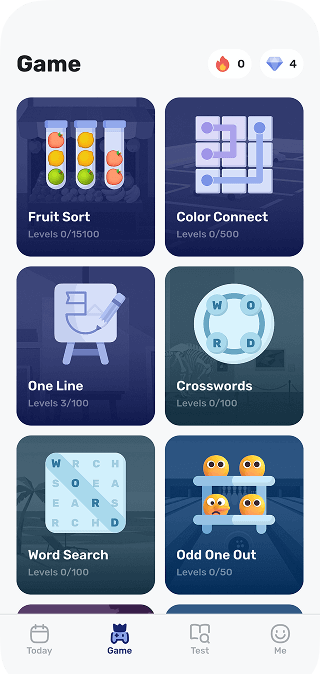Why Can’t I Focus?
Denise Murphy Editor / Oct 17, 2025
Finding your mind wandering and struggling to complete tasks? Ever caught yourself mumbling, “Why can’t I focus?” and even blaming yourself? This isn’t a rare scenario in today’s fast-paced world. And this article will help you understand the reasons behind it and show you how to take back control.

Key Signs You’re Losing Focus
The very first thing to do is recognize the signs of focus fading. Have you ever finished a reading and realized you didn’t absorb a single word? Or found yourself nodding through a conversation but froze when someone asked, “What do you think?” These small moments can be red flags indicating that your focus is drifting.
Other than these subtle moments, signs include:
- Slow Progress - Takes longer than usual to finish even a simple task.
Constant Distraction - Frequently check your phone or email to avoid starting or staying on task. - Procrastination - Avoid tasks that require sustained attention.
- Losing Track - Forget what you’re doing or what comes next, missing appointments or overlooking deadlines.
- Mental Fatigue - Brain feels foggy even after adequate sleep.
A single sign might not mean much, but if you notice several of these signs happening frequently, it’s a good idea to take a step back and assess what’s going on.
Does It Mean ADHD?
It is natural to wonder if these signs mean you have ADHD. While some of the signs of poor focus overlap with the symptoms of Attention Deficit Hyperactivity Disorder(ADHD), they are not always the same.
| Temporary Difficulty Focusing | ADHD | |
| Duration | Short-term | Long-term |
| Causes | Stress, distractions, lifestyle | Genetic and neurological factors |
| Symptoms | Occasional forgetfulness, distraction, procrastination | Persistent inattention, hyperactivity, impulsivity |
| Impact | Usually Mild | Significant |
| Diagnosis | No formal diagnosis | Diagnosed by a healthcare professional |
| Treatment | Lifestyle changes | Medication, therapy, lifestyle adjustments |
While temporary focus issues are common, ADHD is featured by persistent patterns that interfere with daily life. If your focus difficulties are ongoing, affect multiple areas of life, and don’t improve with lifestyle changes, it might be worth discussing with a mental health professional.
What’s Causing Your Poor Focus?
Lifestyle-Related Factors
1. Sleep Deprivation
It's no surprise that sleep deprivation leads to lapses in focus, as we’ve all experienced it firsthand. However, research shows that sleep loss has a strong negative impact on sustained attention. William D.S. Killgore from Harvard Medical School found that even short-term sleep loss can slow reaction times, increase lapses, and weaken focus. Brain imaging studies he reviewed also show reduced activity in key attention-related areas like the prefrontal cortex and thalamus. These effects make it harder to stay alert and perform well on tasks that require concentration.
2. Media Multitasking
Scrolling through your phone while listening to the TV is something we all do. However, while we think we’re handling it so perfectly and efficiently, our brain may be suffering from overload. Instead of focusing on one thing, our attention keeps jumping around, which can weaken memory and understanding. Basically, the more we multitask with media, the more our brain struggles to stay on track.

3. Lack of Physical Exercise
A sedentary lifestyle can affect attention and executive functions negatively. Without regular physical activity, especially aerobic exercise, brain regions like the prefrontal cortex may show reduced activation, making it harder to stay focused and resolve cognitive conflicts.
4. High-Fat Diets
Most people know fast food isn’t good for their health, yet still turn to it during busy times. However, a study revealed that even short-term intake of as little as 5 days of high-fat diets can impair focus and slow reaction time.
Health-Related Factors
Difficulty focusing can sometimes be a symptom of an underlying health condition. In addition to ADHD mentioned earlier, several other physical and mental health issues can also contribute to poor concentration.
1. Stress
You may find that a little stress before an exam would help you to perform better. That is because stress triggers your body to release a hormone called cortisol, which “alarms“ your brain to help you stay sharp. A small amount of cortisol can boost your focus temporarily, like when you’re cramming or racing against a deadline. But if stress lasts too long, that alarm keeps ringing and starts to interfere with your brain. You might have trouble concentrating and forget things more easily.
2. Depression and Anxiety
Depression can slow down your thinking and make it hard to focus, while anxiety often fills your mind with worry, leaving little room for concentration. Both can make everyday tasks feel harder than usual.
3. Dementia
A more serious possibility is dementia, a neurological condition that affects various cognitive functions. While memory loss is the most well-known symptom, early signs of dementia can also include poor concentration and confusion. Although it is more common in older adults, early-onset dementia can occur and is often overlooked when the primary symptom is difficulty concentrating.
4. Medical Conditions and Side Effects
Certain medical conditions, such as thyroid problems or chronic illnesses, can affect your ability to focus. Additionally, some medications have side effects like drowsiness, dizziness, or brain fog, which can reduce concentration and mental clarity. If you notice constant focus issues after starting a new medication, it’s important to talk to your doctor.

How to Improve Focus
You can fight for your focus by adapting new lifestyles and work habits. Making small changes like:
- Setting clear priorities
- Minimizing distractions
- Taking regular breaks
- Practicing mindfulness meditation
- Training focus through brain games
- ……
Since temporary difficulties with focus are usually mild, these adjustments can help enhance your concentration over time. If you’d like more practical strategies on how to stay focused while studying, you might enjoy this YouTube video:
Knowing When to Seek Help?
If you or someone you know experiences persistent difficulties with focus, memory loss, or changes in mood that interfere with daily life, it is important to seek professional help. These symptoms may be linked to underlying conditions such as ADHD, anxiety, depression, or neurological disorders.
A healthcare professional, such as a general practitioner, psychologist, or neurologist, can assess your symptoms, rule out medical causes, and recommend an appropriate treatment plan. Early evaluation can identify underlying causes and lead to better management of symptoms.
FAQ
Q: Is it normal for focus to fluctuate throughout the day?
A: Yes, attention naturally varies due to factors like energy levels, time of day, and activities. Planning demanding tasks when you feel most alert can help.
Q: How are attention problems diagnosed?
A: Diagnosis involves medical history review, cognitive testing, physical exams, and sometimes brain imaging to determine the cause of focus problems.
Q: What are the treatments?
A: Treatments vary depending on the underlying cause and may include medication, therapy, lifestyle changes, and support strategies.
Summary
Difficulty focusing is a common issue that can stem from temporary distractions or signal deeper concerns like stress, ADHD, or medical conditions. Understanding the possible causes and knowing when to seek help can make a real difference in your mental clarity.
Disclaimer
Any assessments and their associated content on this website, regardless of date, are not intended to replace direct medical advice from your physician or other professional. If you experience severe or persistent symptoms, please consult a licensed mental health professional or healthcare provider.












